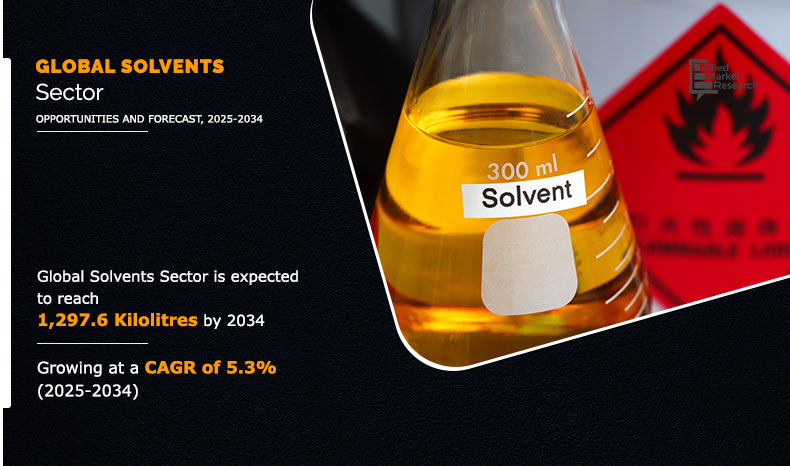The global solvents volume projection was 773.5 kiloliters in 2024 and is projected to reach 1,297.6 kiloliters by 2034, registering a CAGR of 5.3% from 2025 to 2034.

Volume Insights Strategic Overview
Allied Market Research announces the release of its comprehensive analysis of global Solvents sector. Solvents are chemical substances capable of dissolving, suspending, or extracting other materials without chemically changing themselves or the solute. They are widely used in numerous industrial applications to facilitate processes such as cleaning, degreasing, coating formulation, and chemical synthesis. Solvents can be organic (carbon-based) or inorganic, with the former being the most prevalent in commercial and industrial settings. Organic solvents include hydrocarbons, alcohols, ketones, esters, and chlorinated compounds, while inorganic solvents include water and certain liquid salts.
The report highlights the growing demand for solvents, especially solvents for instrumental analysis, research, and QC across key regions and countries. The significant factor contributing to the market's expansion is the advancement of chemical research and development. Academic institutions and research organizations globally are actively engaged in innovative studies requiring high-quality solvents for various applications, including nuclear magnetic resonance (NMR) spectroscopy, mass spectrometry, and chromatography. The pursuit of new chemical entities and materials drives the need for solvents that offer consistency and reliability in experimental procedures.
The demand for solvents such as methanol, acetonitrile, 2-propanol, chloroform, and others is growing globally, driven by an expanding need for high-quality analytical testing across various industries. The pharmaceutical, biotechnology, and environmental sectors are particularly fueling the demand for solvents in instrumental analysis. In pharmaceuticals, these solvents are essential for high-performance liquid chromatography (HPLC), mass spectrometry (MS), and nuclear magnetic resonance (NMR) spectroscopy, which are critical for drug development, quality control, and regulatory compliance. As both countries focus on strengthening their pharmaceutical and biotechnology industries, particularly through stringent quality testing and environmental monitoring, the need for efficient and high-purity solvents increases. These solvents ensure accurate and reliable results in testing the purity, concentration, and stability of drugs and chemicals, making them indispensable in the region’s growing research and development activities. The global volume of solvents for instrumental analysis is expected to grow from 370.6 kiloliters in 2024 to 685.8 kiloliters by 2034, registering a CAGR of 6.3% during the forecast period.
Regional Solvents Sector Volume Growth
North America dominated the solvents sector with 55.2% share in 2024 and a 6.0% CAGR, while Asia-Pacific, Europe, and LAMEA are expected to show strong growth during the forecast period, growing at 4.1%, 6.2%, and 2.9% CAGR, respectively, driven by rapid advancements in chemical research and development and technological advancements in analytical instrumentation.
The regional analysis highlights significant variations in adoption trends and market potential across the globe. North America led the market, contributing over 55.2% of the total volume in 2024 and is expected to grow at a CAGR of 6.0% during the forecast period. The solvents market in North America is driven by several key factors rooted in industrial activity, regulatory shifts, and innovation. One major driver is the strong presence of end-use industries such as pharmaceuticals, automotive, construction, and personal care. These sectors rely heavily on solvents for applications like formulation, cleaning, degreasing, and chemical synthesis. With the U.S. being a global leader in pharmaceutical production and R&D, demand for high-purity and specialized solvents remains high. The region's growing construction and renovation activities also drive solvent use in paints, coatings, and adhesives. Another critical driver is the rising demand for environment-friendly and bio-based solvents, propelled by stringent regulations from agencies like the EPA. Companies are investing in low-VOC and non-toxic solvent alternatives to meet sustainability goals and comply with air quality standards. This regulatory environment encourages innovation and market differentiation through green chemistry. Europe, led by Germany, the UK, France, Spain, Italy and Rest of Europe, is projected to maintain steady growth at a 6.2% CAGR, fueled by a strong focus on sustainability, regulatory compliance, and technological innovation. Asia-Pacific, with key players such as China, India, Japan, South Korea, Australia, and Rest of Asia-Pacific, is expected to grow at a CAGR of 4.1%, supported by industrial expansion, urbanization, and rising consumer demand across key sectors such as paints and coatings, pharmaceuticals, cosmetics, and adhesives in countries such as China and India. Meanwhile, LAMEA offers a significant growth opportunity with a 2.9% CAGR, driven by regions like Brazil and the Middle East, where solvents industry is challenged by supply chain issues and high costs.
Solvents Sector Volume Growth, By Region, 2024-2034 (Kiloliters)
Region | 2024 | 2029 | 2034 | CAGR (2025–2034) |
North America | 426.9 | 587.5 | 761.4 | 6.0% |
Europe | 77.8 | 108.2 | 141.5 | 6.2% |
Asia-Pacific | 215.1 | 271.5 | 323 | 4.1% |
LAMEA | 53.7 | 64.1 | 71.6 | 2.9% |
Total | 773.5 | 1,031.3 | 1,297.5 | 5.3% |
U.S. and China lead the Solvents sector, projected to reach 448.9 kiloliters and 109.1 kiloliters by 2034 at 6.5% and 4.6% CAGR, respectively, while India (4.2% CAGR) and Brazil (3.0% CAGR) emerge as high-growth markets driven by rise in demand for sustainable and environment-friendly solvents.
Solvents Sector Country Sales
The report identifies the U.S. and China as the largest contributors to the solvents market in terms of volume. The demand for solvents in the U.S. and China is driven by advancements in analytical instrumentation and increase in demand for precision in key industries such as food and beverage testing, forensic analysis, and environmental monitoring. As regulatory agencies impose stricter quality and safety standards, laboratories across these sectors require high-purity solvents to ensure accurate and reliable results in analytical procedures, including liquid chromatography (LC), gas chromatography (GC), and spectroscopic techniques. In the food industry, stringent regulations regarding safety and quality have heightened the need for high-performance solvents in analytical testing. Food safety laboratories depend on these solvents for the detection of pesticide residues, identification of contaminants, and assurance of ingredient authenticity in processed foods. The U.S. solvents sector is projected to reach 448.9 kiloliters by 2034, achieving a CAGR of 6.5%. China, on the other hand, remains an important player in Asia-Pacific, growing at a steady 4.6% CAGR and accounting for 109.1 kiloliters by 2034.
Solvents Sector Volume Share, By Country, 2024-2034 (Kiloliters)
Country | 2024 | 2029 | 2034 | CAGR (2024-2034) |
U.S. | 238.7 | 337.6 | 448.9 | 6.5% |
Canada | 118.7 | 161.5 | 207 | 5.7% |
China | 69.6 | 89.9 | 109.1 | 4.6% |
India | 56.2 | 71.2 | 84.8 | 4.2% |
Germany | 22.1 | 31.2 | 41.5 | 6.5% |
Brazil | 21.2 | 25.4 | 28.5 | 3.0% |
Investment in supply chain resilience, innovation in solvent purification technologies, and strategic collaborations with research and QC laboratories are key priorities. The Asia-Pacific region’s rising economic influence and integration with global pharmaceutical and biotech supply chains boost its growth in the high-purity solvents market. Digital transformation in laboratory workflows, including AI-driven data analysis and automated solvent handling, further enhances operational efficiencies, reducing waste and improving analytical precision. Companies that focus on expanding local manufacturing capabilities and securing reliable distribution networks will gain a competitive edge.
Solvents Sector Volume Trends
The report also emphasizes the growing role of solvents for instrumental analysis, research, and QC purposes. The rising focus on environmental sustainability and public health globally has accelerated the need for more comprehensive chemical analyses. Solvents like acetonitrile and methanol are key for environmental testing, including water quality assessments, soil contamination studies, and waste management, ensuring compliance with local and international environmental standards. As countries such as the U.S., Canada, China, India, Germany, and others continue to expand their environmental monitoring efforts to address issues like climate change and pollution, the demand for solvents to perform complex instrumental analyses will keep growing.
Furthermore, the pharmaceutical and healthcare industries globally rely on these solvents for drug formulation, extraction, and analysis. Chloroform and methanol are extensively used in chromatography and spectroscopy techniques for quality control and analytical testing of pharmaceutical compounds. The demand is also driven by regulatory standards requiring stringent testing of drugs, food products, and environmental samples. The presence of well-established pharmaceutical companies and research collaborations between universities and industries further contribute to the rising need for high-purity solvents.
Additionally, the agricultural and environmental research sectors in these countries require solvents for pesticide residue analysis, soil testing, and water quality monitoring. With growing concerns about climate change and sustainability, researchers are using these solvents to study pollutants and develop eco-friendly solutions. Methanol and chloroform are key in sample preparation for mass spectrometry and gas chromatography, essential for environmental testing. Overall, the demand for these solvents continues to grow due to expanding research activities, stringent analytical requirements, and increasing investments in scientific innovation globally.
Solvents stakeholders should use the report’s insights to grab new opportunities and plan ahead.
About Allied Market Research
Allied Market Research is a full-service market research and business consulting firm, which provides actionable insights and strategic recommendations to help clients make informed decisions and achieve sustainable growth. For more inquiries, please visit alliedmarketresearch.com.
About Allied Market Research
Allied Market Research is a full-service market research and business consulting firm, which provides actionable insights and strategic recommendations to help clients make informed decisions and achieve sustainable growth. For more inquiries, please visit alliedmarketresearch.com


